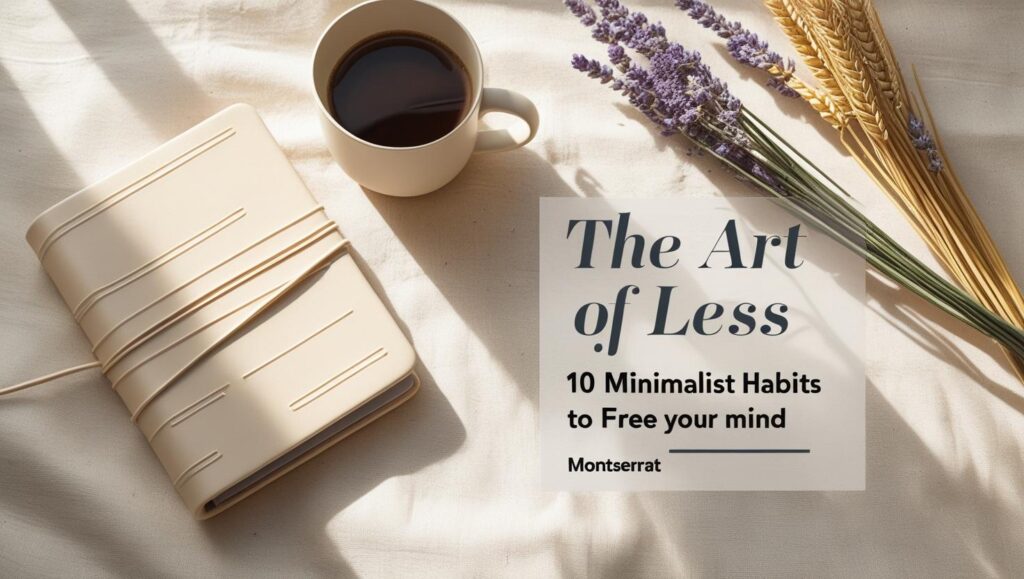Introduction: Why Minimalism Matters in 2025
In today’s fast-paced world, simplicity is more than a design choice—it’s a survival skill. We’re constantly bombarded with information, commitments, and distractions. The result? Mental fatigue, stress, and burnout. But what if you could press pause and simplify your life?
That’s where minimalist habits come in. Minimalism isn’t about throwing away all your stuff or living with one pair of jeans. It’s about being intentional—choosing less so you can experience more. The less mental and physical clutter you have, the more space you create for clarity, creativity, and peace of mind.
Developing minimalist habits can help you focus on what truly matters and reduce unnecessary stress.
Here are ten minimalist habits that can help you simplify your day-to-day life and finally feel in control again.
1. Declutter with Intention

Minimalism isn’t just about having fewer things — it’s about being intentional with what you keep. Begin by decluttering one area of your life — your closet, your desk, or your phone. Ask yourself, “Does this add value to my life?”
Why it matters: Physical clutter leads to mental clutter. Studies show that a messy environment can increase stress and reduce focus.
Pro Tip: Try the 30-day declutter challenge — remove one item on Day 1, two on Day 2, and so on. By the end, you’ll have cleared nearly 500 unnecessary items.
2. Practice Digital Minimalism
The average person spends over 3 hours a day on their phone. That’s more than 45 days a year!
Why it matters: Constant notifications, endless scrolling, and app hopping drain your energy and focus. Practicing digital minimalism means cutting out the digital noise.
Action Step: Delete unused apps. Turn off non-essential notifications. Schedule one hour daily where your phone is in another room.
Read more: Digital Minimalism: Clear the Noise, Do More Work.
3. Embrace the Power of “No”
Saying “yes” to everything spreads you thin. Learning to say “no” frees up your time, energy, and peace of mind.
Why it matters: Boundaries are essential for mental clarity and emotional well-being. Overcommitting leads to burnout and resentment.
Real-life example: Warren Buffett once said, “The difference between successful people and very successful people is that very successful people say ‘no’ to almost everything.”
Action Step: Before agreeing to a commitment, pause and ask, “Does this align with my priorities?”
These minimalist habits encourage intentional living, making it easier to simplify your daily routine.
4. Simplify Your Wardrobe
Ever heard of decision fatigue? The more choices you have to make, the more your brain tires out. A minimalist wardrobe helps you save time and reduce stress.
Why it matters: Streamlining what you wear simplifies your mornings and reduces clutter in your closet.
Start with: A capsule wardrobe — a small collection of versatile clothing pieces that mix and match well.
Bonus tip: Stick to neutral colors and timeless styles. Quality over quantity always wins.
5. Create a Morning Ritual

A consistent, intentional morning routine can shape your entire day.
Why it matters: Starting your day with clarity instead of chaos boosts productivity and reduces anxiety.
Keep it simple: A few deep breaths, a glass of water, and a 5-minute journal entry can set the tone for the day.
Helpful read: The Ultimate Morning Routine Checklist.
6. Buy Less, Choose Better
Minimalists don’t necessarily spend less — they spend smarter. Instead of buying multiple cheap items, they invest in fewer, high-quality ones.
Why it matters: This habit reduces waste, saves money in the long run, and ensures you truly value what you own.
Think before you buy: Ask yourself:
- Do I need this?
- Will I still use it in a year?
- Can I live without it?
External source: The Minimalists’ Shopping Rules.
By adopting simple minimalist habits, you create space for creativity, rest, and personal growth.
7. Unsubscribe and Unfollow

Take control of your digital space just like your physical one. Unsubscribe from marketing emails, unfollow accounts that don’t inspire you, and mute the noise.
Why it matters: Your online environment affects your mindset. Curate it like you would your home.
Try this: Dedicate 15 minutes each week to a digital cleanup. Over time, you’ll notice a quieter, more positive online space.
8. Practice Mindful Consumption
Mindful consumption means being thoughtful about what you bring into your life—whether it’s things, media, or even your time. Instead of buying or consuming mindlessly, pause and ask yourself if it truly adds value or joy.
In today’s world, it’s easy to get caught up in buying the latest trends or endlessly scrolling through social media. Mindful consumption helps you focus on quality over quantity and reduces clutter in both your space and mind.
By choosing only what you really need or enjoy, you save money, reduce waste, and create room for what truly matters.
9. Simplify Your Finances
Minimalism applies to money too. Having too many bank accounts, subscriptions, and financial obligations causes unnecessary stress.
Why it matters: Financial clarity creates freedom. Minimalist money habits help you focus on what truly matters — security, freedom, and peace of mind.
Steps to take:
- Automate bill payments
- Cancel unused subscriptions
- Consolidate accounts where possible
- Track your spending weekly
10. Design Your Life Around What Matters
One of the core principles of minimalism is focusing your time, energy, and resources on the things that truly matter to you. This means intentionally designing your life to align with your values and priorities rather than getting caught up in distractions or societal expectations.
To begin, take a moment to reflect deeply on what brings you genuine happiness, fulfillment, and meaning. Is it your family? Creative pursuits? Health? Helping others? When you clearly identify these core values, it becomes easier to say no to activities, possessions, or commitments that don’t support them.
Minimalist living isn’t about deprivation; it’s about making room for what matters most. This might involve decluttering your physical space so you’re surrounded only by things that spark joy or have practical use. But it also means decluttering your schedule and digital life to free up time for what truly enriches your days.
For example, instead of filling your calendar with endless meetings or social obligations that drain your energy, choose quality time with loved ones or moments of solitude for reflection and creativity. Instead of buying gadgets and trendy products that clutter your home, invest in experiences or tools that help you grow.
Designing your life around what matters helps you live intentionally and with purpose. It shifts your mindset from “more is better” to “better is enough.” This focus reduces stress, increases satisfaction, and ultimately leads to a more meaningful, balanced life.
Many people find that incorporating minimalist habits leads to greater clarity and a more balanced life.
Final Thoughts: The Beauty of Less

Minimalism isn’t about restriction — it’s about liberation. When you remove what doesn’t matter, you make room for what truly does. By adopting these minimalist habits, you’ll not only free your space but also your time, your mind, and your heart.
Start with small minimalist habits and gradually transform your environment and mindset for the better.
Start small. Pick one habit from this list today. It might just change everything.
